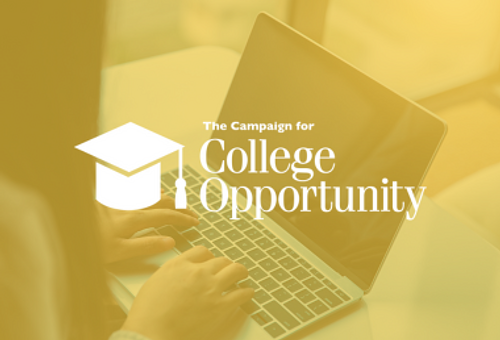
Black Student Success in Higher Education: Rooted in Community, Driven by Equity
This blog post is part of our upcoming publication, Ensuring College Access and Success for Black Students in Higher Education, releasing April 17. It is part of our Equity, Inclusion, Action series, which elevates the equitable opportunity for every person in America to own their right to a college education free of barriers to strengthen and thrive in our nation’s multiracial democracy and economy. It will become available here.
Raised in Los Angeles, and an alum of the Los Angeles Unified School District, Santa Monica College, University of California, Los Angeles (UCLA) and California State University, Northridge, I am the only daughter and very proud youngest child of Guyanese immigrants. I am first generation in many ways— first generation in the United States, first-generation college student, and first-generation college graduate. My parents’ motivation to migrate was informed by a want to provide opportunities for their children, which allowed me to pursue higher education. The importance of education was instilled in me at a young age, coupled with being rooted in community and service. Being raised by a retired activist, I was encouraged to question, explore, and seek solutions, which sparked my strong interest in becoming an attorney.
As a Black woman, I experienced barriers to persistence in spaces of oppression early on. I was identified as “gifted/talented” student early in elementary school, but experienced stigmatized, racialized, gendered, and class-based stereotypes that made me feel less than. On all my progress reports, I was described as “too much, too talkative, too opinionated, too loud, I couldn’t keep still.” In third grade, my teacher informed my parents that if they didn’t “get me under control,” I would struggle with teachers, and face many detentions.
Experiences with adultification, where Black children, especially girls, are perceived as older and treated more punitively, permeated my educational experiences until college. I switched schools often due to “mismatches,” attending 3 high schools, 2 junior highs, and 2 elementary schools. It feels like a miracle that I graduated and proceeded to enroll in college. My understanding of college came from the media. I knew nothing about the application or the admissions process. Community college demystified the process for me in a safe way. Although I stumbled through community college to find resources and support, it changed my entire life.
Professors and counselors at my community college acknowledged and encouraged me. They were transparent about their identities and intersections, making their life experiences relatable. When I couldn’t register for a class at 1 p.m. in the afternoon due to work, the counselor didn’t question or ask me to explain. They simply found another class section and asked if it worked better.
My success in higher education is the result of community and care. My family supported me as I pursued my education and career, even when they did not fully understand the process. I do this with them, for them, and never without them.
At Santa Monica College, it was the Black Collegians program that led me to the Center for Community College Partnerships (CCCP) at UCLA. These programs honored the experiences of racially minoritized transfer students and communities. I found my community as a scholar of the CCCP’s Summer Transfer Program among other students with their own, yet similar, challenges of navigating higher education and society as racially minoritized people. The program offered webinars and peer advisors to help understand the requirements necessary to transfer and earn a bachelor’s degree.
At UCLA, it was the counselors at the Academic Advancement Program who never questioned why I had to work outside of the university and provided direct advice and guidance, clearing barriers and hurdles. There,I began to explore the persistent opportunity gaps for Black students in higher education and that inquiry led to a career and a master’s program.
During my master’s at CSUN, faculty with expertise in transfer students supported my pursuit of fellowships and research, leading me to a doctoral program. At the University of Illinois Urbana-Champaign, a village of mentors and research assistants have uplifted me. My advisors continue to encourage and hold me accountable, never doubting my ability to complete a doctoral degree.
My successes and persistence in higher education are attributed to care, advisement, intentional guidance, and investment. These intentional investments signaled that higher education was a space for me. This moment, as access and diversity are under attack, is a reminder that Black students, with the appropriate supports and systemic investments, can thrive, persist, and succeed.
The institutional and culturally responsive support that helped me transfer and persist is often lacking for others with similar identities. Students like me, labeled too loud, too much, too ‘anything’ are not the problem. Rather, it is the systems that need to change, to ensure the success of all students. Policies at the institutional, state, and federal levels must be updated to meet the needs of today’s students’ needs.
As a Black woman, daughter of Guyanese immigrants, low-income first-generation student, community college alumna, and transfer student, closing gaps for Black students and ensuring access is personal-statistically, I am not supposed to be in these positions. As Toni Morrison said, “When you get these jobs that you have been so brilliantly trained for, just remember that your real job is that if you are free, you need to free somebody else. If you have some power, then your job is to empower somebody else.”
My journey through higher education has been non-linear, yet I’ve experienced its transformative power. I continue to believe in the promise of higher education, that when implemented with student centeredness at the core, it changes lives and expands possibilities, as it has done for me.
